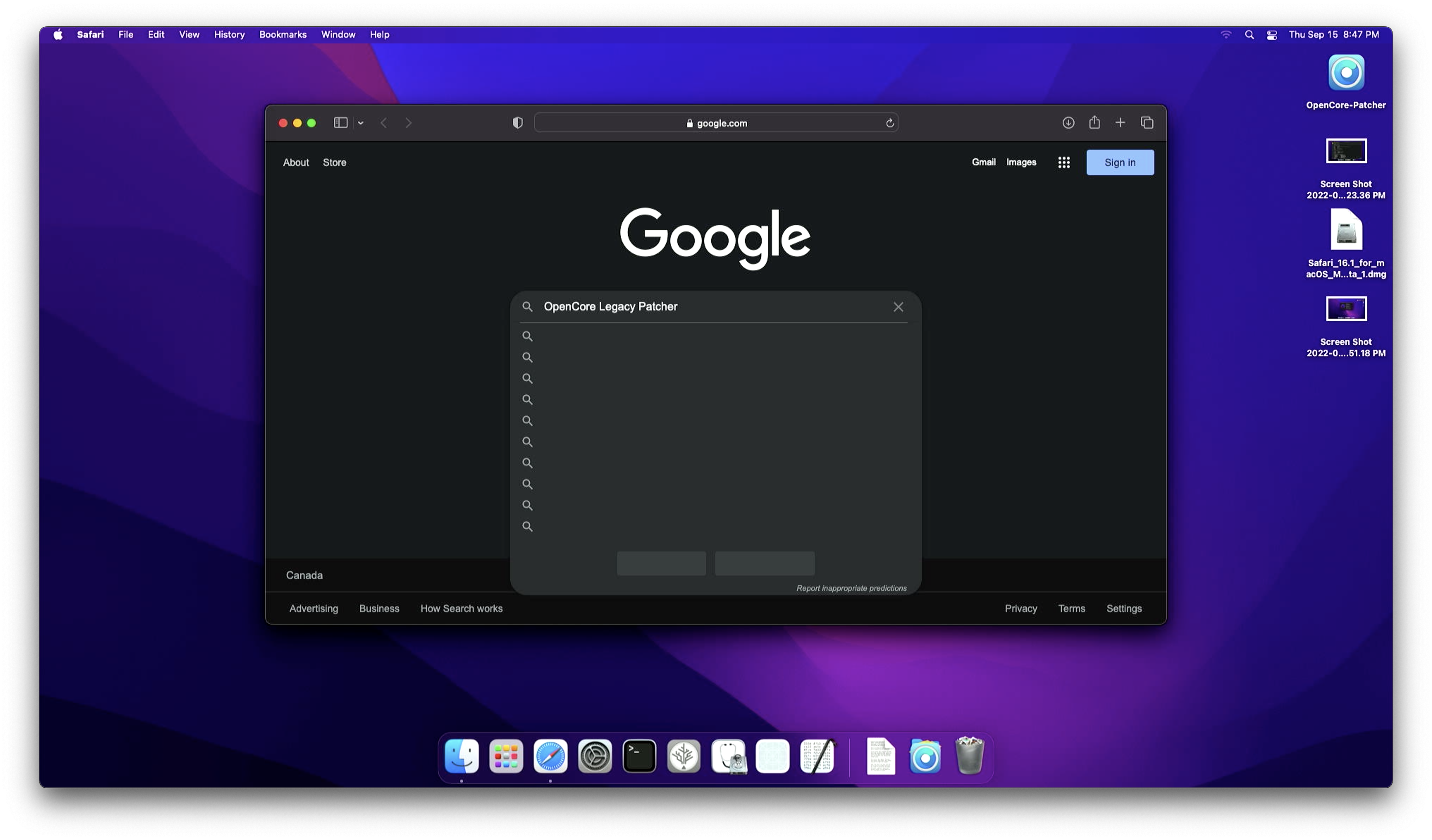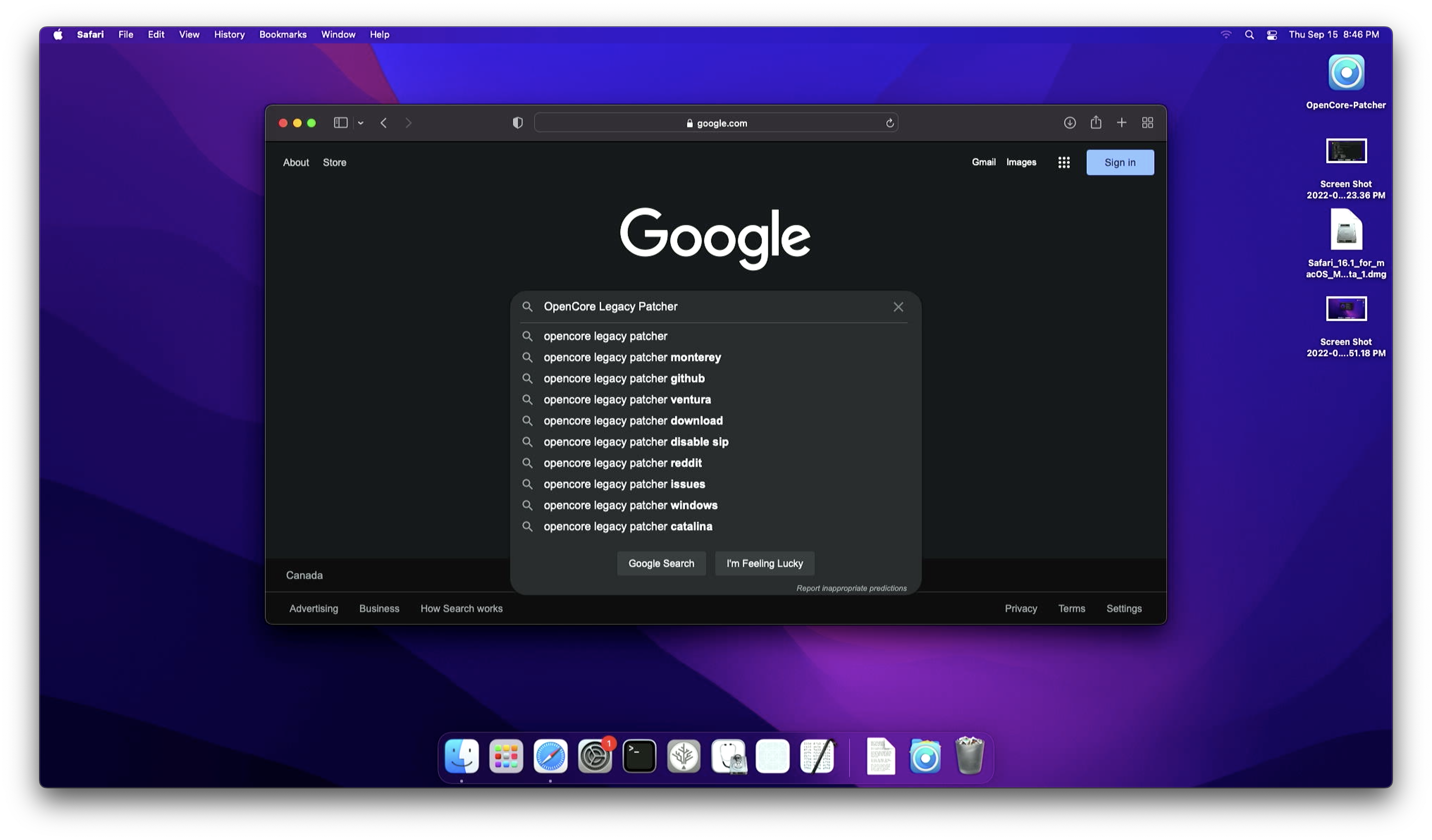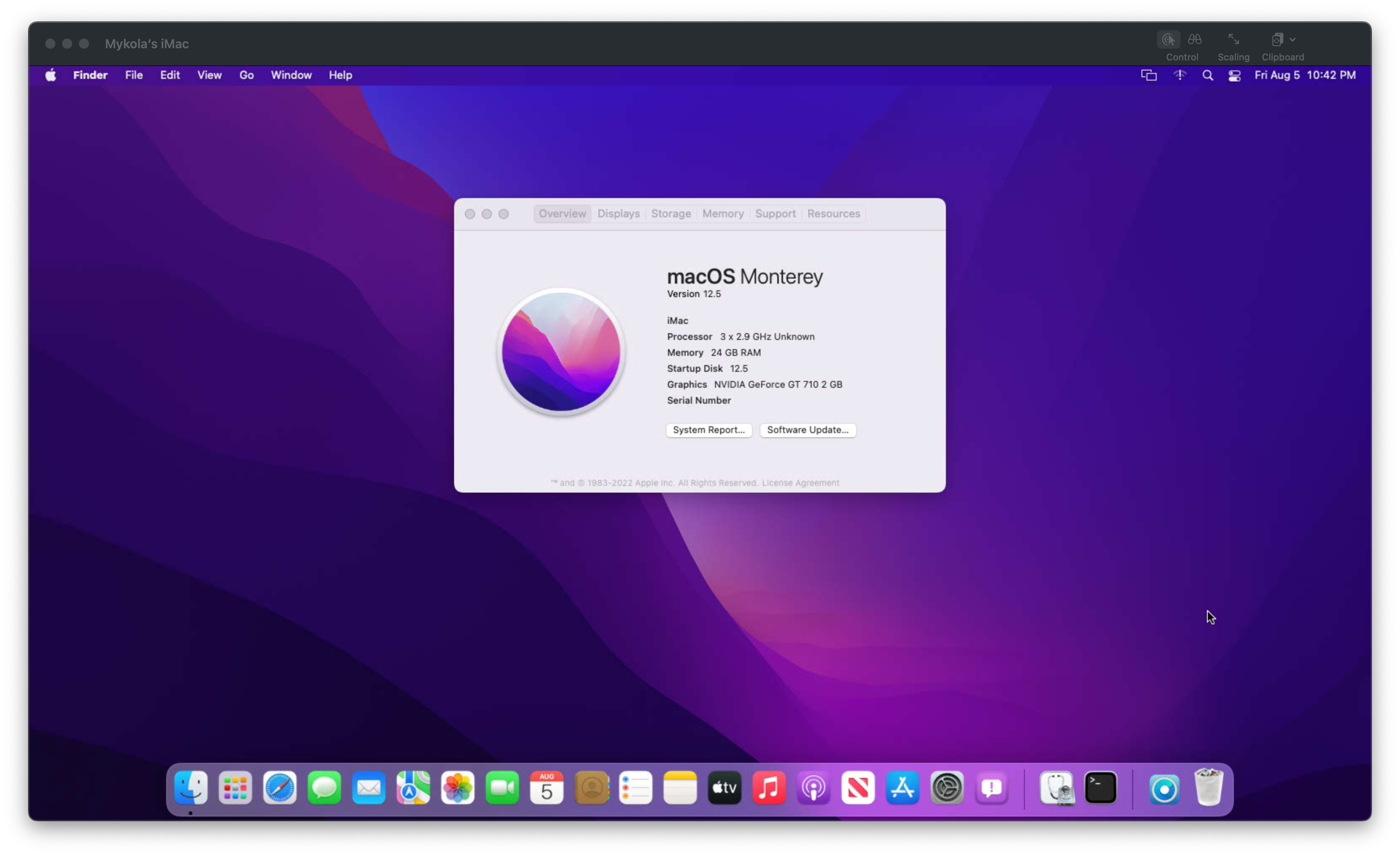This page will be updated as we learn more about Ventura and the changes within.
-
If you're not an active developer for legacy Macs, DO NOT INSTALL VENTURA. Even if you're bored, more random users installing the beta create more noise and thus more difficult to properly develop patch sets.
-
Know that this is an early developer beta and that hardware bricks can happen and be unrecoverable. Only continue on if you're alright flushing the hardware down the drain.
With the initial developer beta, we're seeing many changes to the OS that affect our work with OpenCore Legacy Patcher. Some of these include:
- Removal of all pre-Kaby Lake models
- Removal of pre-AVX2.0 dyld shared cache
- Removal of on-disk binaries for kexts in
/System/Library/Extensions
- Removal of Haswell, Broadwell, Skylake, and AMD GCN 1-3 graphics stack
- Removal of UHCI/OHCI USB stack
- Removal of USB Maps for older units
- Removal of Intel Ethernet support
- Removal of Pre-Force Touch Trackpad support
- Library Validation and AMFI changes
- Boot issues on MacPro6,1
- Broken Power Management on Ivy Bridge and older
- Broken Wireless Patches for legacy Wifi Cards
- FeatureUnlock race condition
Removal of all pre-Kaby Lake models
This release removes the following models:
- MacBookPro11,4/5, MacBookPro12,1, MacBookPro13,x
- MacBookAir7,x
- MacBook9,1
- Macmini7,1
- MacPro6,1
- iMac16,x, iMac17,1
Removal of pre-AVX2.0 dyld shared cache
With the discontinuation of OS support for the MacPro6,1 (Trash Can), Apple no longer has any reason to retain pre-Haswell support in macOS. This means that important parts of macOS, namely the dyld shared cache, no longer ship a non-AVX2.0 variant on Intel.
However, as we expected, Apple didn't update Rosetta to support AVX2.0 and thus has given us a partial back door with Rosetta's dyld shared cache.
With Ventura, the shared cache is now off of the Root volume and instead inside the Preboot volume. Thus the Rosetta cache is not available to us if it wasn't installed during the installation.
- The goal to move the dyld cache to Preboot seems to be to allow for quicker security updates as well as reduce the total size of the on-disk installation by creating more architectural-specific installations.
With the advent of CryptexFixup.kext, Rosetta Cryptex will now automatically be installed during OS installs and updates. Information below is now for reference purposes.
- OpenCore Legacy Patcher v0.5.0 (commit 4ef2c00) and newer includes CryptexFixup.kext
Manual Method
To rip the non-AVX2.0 cache on Apple Silicon, there are 2 methods:
- Rip from an active Apple Silicon installation
- Extract from an Apple Silicon IPSW
The methods are listed in one of the attached comments.
Once you have acquired the correct OS.dmg, apply them to the Intel installation at /System/Volumes/Preboot/{Ventura Preboot UUID}/cryptex1/current (remember to find the correct UUID for the Intel install, as each UUID is unique to each installation)
- Ensure the disk image is renamed to OS.dmg if you extracted from the IPSW
Finally, swapping dyld shared caches in Preboot will trigger a kernel panic during Root Hash verification. OpenCore Legacy Patcher will enable a patch to skip this check:
https://github.com/dortania/OpenCore-Legacy-Patcher/commit/03b8b4655041cccb6b099020265c4fcb9c297dc6#diff-e6e31b873ed817965dd126ab9dd4ff17d91e0b0ed49dc87f1ecd0c89bebd9a1dR1688-R1717
- As mentioned above, CryptexFixup will also handle the APFS patch for end users
Removal of on-disk binaries for kexts in /System/Library/Extensions
Similar to how iOS has been for several years, Ventura has now removed the on-disk binaries inside of kexts in /System/Library/Extensions. Now instead, developers are required to download and install the Kernel Debug Kit from Apple's Developer Site anytime they wish to create a new Boot and System Kernel Collection.
- Kernel Debug Kits require an Apple account to access, however free accounts are supported
Due to the nature of Root Volume patching in OpenCore Legacy Patcher, we cannot automate this without rehosting files and requiring a network connection during root patching. We will be researching more, however, for the initial beta cycle, we expect to require KDKs to be installed by the end-user before running.
Additionally Kernel Debug Kits are per-build specific, as using an older build will mean using older kernels, etc. kmutil does support mismatched KDKs however realitically this should be avoided under all circumstances.
Removal of Haswell, Broadwell, Skylake, and AMD GCN 1-3 graphics stack
As expected, Apple has also removed graphics support for Haswell through Skylake as well as GCN1 through 3. Unfortunately, there seem to have also been changes to the Metal stack, that have broken support for older Metal graphics including all those most recently dropped.
A framebuffer is easily achieved by re-adding the extensions, however, Metal will take some development time to achieve. Ventura has changed much of the Metal stack, meaning we need to learn a whole new part of macOS's graphics stack to re-implement support for older cards.
- In future documents, we'll be referencing pre-Ventura Metal drivers as "Legacy Metal" for simplicity.
And as a reminder to the .bundle situation, Apple no longer ships true .bundle files on-disk anymore. Instead, they're hollow files where the actual binaries are located within the dyld shared cache. The last time these binaries were on-disk was with macOS 11.0 20A5364e (Beta 6).
Regarding using other binaries from the dyld shared cache, you'll need to grab the binaries from a RAM disk that's shipped with OS installers and updaters. The RAM disk is located under the SharedSupport.dmg:
/Applications/Install macOS.app/Contents/SharedSupport/SharedSupport.dmg:
/Volumes/Shared Support/com_apple_MobileAsset_MacSoftwareUpdate/{random string of hex}.zip (size is about 12GB~):
{random string of hex}/AssetData/usr/standalone/update/ramdisk/x86_64SURamDisk.dmg
Early research notes attached with regards to Ventura acceleration:
- https://github.com/khronokernel/khronokernel.github.io/blob/legacy-metal/_posts/2022-08-01-2022-LEGACY-METAL.md
With regards to the introduction to Metal 3, this has little effect on us. Metal 3 is just an API feature set, and is actually limited to newer GPUs only:
| GPU Architecture | Support |
| :--- | :--- |
| Intel Kaby Lake | Metal 2 |
| Intel Coffee Lake | Metal 3 |
| Intel Ice Lake | Metal 3 |
| AMD Polaris | Metal 2 |
| AMD Vega | Metal 3 |
| AMD Navi | Metal 3 |
Removal of UHCI/OHCI USB stack
Currently Apple has removed the following drivers:
IOUSBHostFamily.kext/Contents/PlugIns/AppleUSBOHCI.kext
IOUSBHostFamily.kext/Contents/PlugIns/AppleUSBOHCIPCI.kext
IOUSBHostFamily.kext/Contents/PlugIns/AppleUSBUHCI.kext
IOUSBHostFamily.kext/Contents/PlugIns/AppleUSBUHCIPCI.kext
They will need to be reinjected to resolve USB 1.1 support for pre-Ivy Bridge units.
- Reminder on Penryn units, Keyboard and Trackpad are wired through the USB1.1 controller thus breaking support.
Removal of USB Maps for older units
Now all units need a USB map provided, as Apple has removed the remaining units:
/System/Library/Extensions/IOUSBHostFamily.kext/Contents/PlugIns/AppleUSBHostPlatformProperties.kext/Contents/Info.plist
Removal of Intel Ethernet support
Following Network Drivers have been removed:
- AppleIntel8254XEthernet.kext
- Intel82574L.kext
- AppleIntelI210Ethernet.kext (transitioned to DriverKit)
Removal of Pre-Force Touch Trackpad support
Following kexts were removed:
- AppleUSBTopCase.kext
- AppleUSBMultitouch.kext
Re-injecting both kexts restores pre-Force Touch trackpad support
Library Validation and AMFI changes
With Ventura, our _cs_require_lv patch broke which we rely on to pass our shim'd binaries as allowable in macOS under their security policy. In addition to our patch breaking, Apple has modified the requirements for disabling AMFI outright.
With Ventura, AMFI can no longer be disabled in Safe Mode, as well when CSR_ALLOW_UNTRUSTED_KEXTS is not toggled (we assume this is related to DriverKit). Thus to disable Library Validation and AMFI in general, you'll need:
- Bit 0x1 flipped in SIP
amfi_get_out_of_my_way=0x1 in boot-args
We will be researching what other patches can be used in the future to alleviate this.
Boot issues on MacPro6,1
With macOS Ventura, Apple has changed some early init logic that has broken support for MacPro6,1. Currently no known work-around is available for these units.
More information can be found below:
Broken Power Management on Ivy Bridge and older
~~Odd issue experienced on pre-Haswell machines is broken power management. Specifically machines will be stuck at their base clock, and will not boost or idle correctly.~~
~~Looking at IOService, we can see that the X86PlatformPlugin (or ACPI_SMC_Platform_Plugin on Sandy Bridge and older) no longer publish CPUPLimitDict and IdlePlimitDict entries. Downgrading IOPlatformPluginFamily.kext does not seem to resolve, further research required.~~
Power management resolved by removing intel_cpupm_matching check in AppleIntelCPUPowerManagement.kext
Broken Wireless Patches for legacy Wifi Cards
- Atheros: All models
- Broadcom: BCM94328 and BCM94322
Support has been resolved in OpenCore Legacy Patcher v0.5.4
FeatureUnlock race condition
With macOS Ventura, currently there's a race condition with userspace patching on slower hardware. At this time, we'd recommend staying on macOS Monterey if you need any features provided by FeatureUnlock.
- Newer hardware generally won't experience this issue
Overall estimate time for support
Looking at all the issues in front of us, I don't believe there's any short term possible fixes for the community to use. Best time frame would be 6 months from now when a proper build of OpenCore Legacy Patcher can be released, but even this is difficult to promise.




 |
|  |
|
|
|  |
|  |
|

 |
|  |
|
 |
| |
| |
|
 |
|  |
|